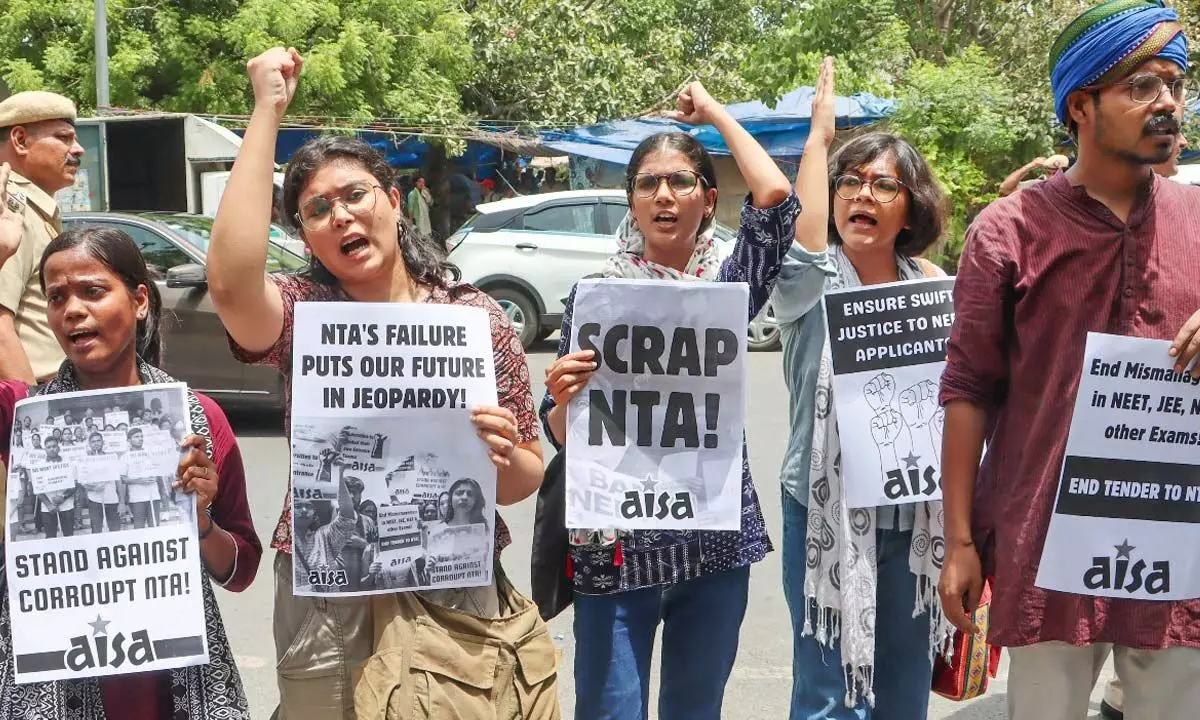Live
- Visakhapatnam: Spiritual meeting today
- SSC exam fee date extended
- Govt expedites Phase-I of scheme
- Remarks Against Ambedkar: Congress demands Union Home Minister Amit Shah’s resignation
- Decision likely on 2-child policy for rural body polls after caste census
- 2.79 lakh MTs of paddy purchased in Eluru dist
- MLA GV Anjaneyulu visits rain-hit agriculture fields
- Cyberabad sees 64 per cent Surge in Crime Rate
- Maternal Deaths: Collector O Anand expresses ire over medical staff
- TTD unveils vision for Global Outreach
Just In
New Law To Combat Exam Paper Leaks And Solver Gangs In Uttar Pradesh


- Amid NEET and UGC-NET exam irregularities, the Uttar Pradesh government announces stringent measures to prevent paper leaks.
- It curb solver gangs, including heavy fines, imprisonment, and enhanced security protocols at examination centers.
Amid ongoing controversies surrounding irregularities in key entrance exams such as NEET and UGC-NET, the Uttar Pradesh government has announced plans to introduce a new law aimed at preventing paper leaks and curbing the activities of solver gangs.
The proposed legislation will include stringent measures against those involved in such malpractice, encompassing severe penalties, "bulldozer action," and imprisonment.
This move by the Yogi Adityanath-led government follows the recent cancellation of the UGC-NET exam by the National Testing Agency (NTA) after the question paper was discovered on the darknet. Additionally, NEET is also under scrutiny for similar allegations of irregularities.
In response, the UP government aims to safeguard the integrity of the examination process through several measures. These include implementing a new policy to prevent paper counting issues by having at least two different sets of exam papers printed by separate agencies for each shift. Paper coding procedures will also be more systematically organized.
Examination centers will be limited to government secondary schools, degree colleges, universities, polytechnics, engineering colleges, medical colleges, or reputable and well-funded educational institutions with clean records. These centers will be equipped with CCTV systems, and four distinct agencies will handle various aspects of conducting recruitment tests.
Candidates will be required to take exams outside their home divisions, with exceptions for disabled individuals and women. If candidate numbers exceed 4 lakh, the exam will be conducted in two phases.
For the Provincial Civil Service exam, a single shift may be implemented. To prevent result tampering, OMR sheet scanning will be handled directly by the Commission and the Board. Question papers will feature secret codes and confidential security elements such as unique barcodes, QR codes, and serial numbers on each page to ensure traceability.
The transportation of question papers will involve tamper-proof, multi-layer packaging, with sufficient time allocated for setting the papers. Printing agencies will undergo regular inspections by the controller of examinations.
The selection of printing presses will be conducted with the highest confidentiality. Visitors to the press will be screened, ID cards will be mandatory, and access for outsiders will be prohibited. Additionally, there will be a complete ban on smartphones and cameras within the press. CCTV cameras will be installed around the press, with recordings maintained for one year.

© 2024 Hyderabad Media House Limited/The Hans India. All rights reserved. Powered by hocalwire.com






